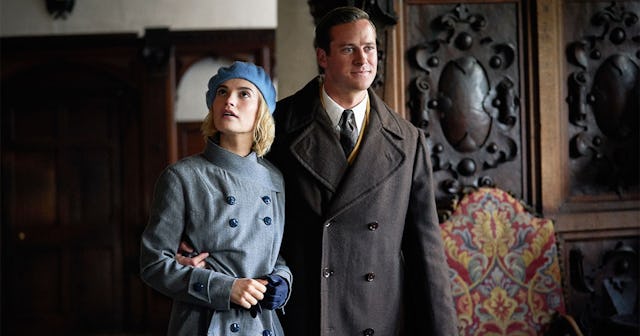What You Should Know About Netflix's 'Rebecca'—Trust Me, You Need To Know This Stuff

Netflix’s Rebecca, with its gorgeous cinematography and impossibly beautiful cast, could be viewed on mute and still be entertaining. Prior to watching this movie, I had no idea who Armie Hammer is, but he looks like a Ken doll and apparently he’s a thing? (Sorry; I’m gay.) His romantic interest in the movie, Lily James, looks like if January Jones and Emilia Clarke produced a love child. There’s plenty to look at here.
But that’s not why I recommend you watch this movie—preferably with a friend or partner. I recommend Rebecca entirely because the movie has a really cool history behind it that is super fun to geek out on (hence the need for a movie-watching buddy). Rebecca is a movie for movie buffs.
A synopsis: An unassuming young woman from a low-class background falls in love with Maxim de Winter, a handsome British aristocrat who, after a whirlwind courtship, marries her and sweeps her off to his imposing seaside estate, Manderly. Immediately upon arrival, our main character meets the stone-faced Mrs. Danvers, house manager and loyal long-time assistant to the first Mrs. de Winter, named Rebecca. Rebecca’s memory haunts the massive house, and the “accident” that killed her is spoken about in hushed tones, ostensibly so as not to upset Mr. de Winter. Beautiful, magnetic, and fearless, Rebecca was beloved by all who encountered her. There is clearly little chance that the second Mrs. de Winter will be able to fill the shoes of the first one. As she settles into her new life, her new husband grows more and more distant, and clues begin popping up that there is far more to this story than appears.
KERRY BROWN/NETFLIX
I went into Rebecca with no additional context, and my initial reaction was, “Well, that was nice. It sort of felt like a novel with all those clever twists!” I had questions too though, like: How did this supposedly poor “lady’s companion” afford all those beautiful clothes? Does she have any reason to like this Maxim guy other than that he’s rich? (Because, unless owning a convertible counts, this dude has, like, zilch personality.) Does this gorgeous main character have a name? Why does no one ever say her name? Um, wait, am I supposed to be rooting for this person to get away with murder?
I needed answers, so I consulted the Google. First, I discovered that Rebecca actually is a novel, by Daphne du Maurier. When it was published in 1938, it was a smashing success, so popular that producers scrambled to get first rights to make a movie of it. The other things I learned about Rebecca are why I recommend this movie—well, both movies, and the book—as a movie night in for movie nerds.
Rebecca was Hitchcock’s U.S. directing debut, and his only movie to win an Academy Award for best picture. Hitchcock distanced himself from the movie in later years though, because he was frustrated with the strict censoring rules that forced him to modify various dialogue and visuals in his movie. The Hays Code, a collection of strict “morality” guidelines governing the the U.S. movie industry, controlled American films from 1934 to 1968.
KERRY BROWN/NETFLIX
This is one of the best bits to geek out on when comparing Hitchcock’s 1940 work to Ben Wheatley’s 2020 remake. The 1940 original script adaptation of the book had to contend with code violations pertaining to “sex perversion” and explicit violence. In the book, the title character dies by gunshot wound to the chest. In Hitchcock’s version, as required by the Hays Code, Rebecca’s death is softened into an unfortunate accident. This difference profoundly alters the nature of the character responsible for her death, and by extension, the foundation of the story.
Did I not warn you this was some geeky shit?
The other super fun thing that I totally missed, because I have notoriously terrible gaydar even though I’m gay: Mrs. Danvers, the menacing house manager, was likely really in love with the late Rebecca. I’d been reading Mrs. Danvers’s unrequited obsession as employee loyalty. Duh. There’s even a part in both movies where she swoons over Rebecca’s closetful of clothes, reminisces about brushing her hair for long periods of time, and then holds up a sheer negligee and proclaims to our main character how you can see right through the material.
The reviews of the remake are scathing. The New York Times, NPR, and The Verge all basically skewer it, and justly so, I suppose. Even I, with my snobby and oblivious modern aesthetic, preferred the Hitchcock black and white version over the updated adaptation that had every advantage of modern technology. The unnamed main character is more timid and insecure as written in the novel, Mr. de Winter is moodier, and Mrs. Danvers is creepier and more obviously vengeful. I also preferred most of the dialogue of the original.
That’s not to say I didn’t like this remake though; I did. It’s just that my enjoyment of it quadrupled when I realized that there is a whole history behind the movie—including all the delicious hidden queer stuff—that I could delve into and analyze.
So, pop a whole lot of popcorn, get cozy in your comfy chair with your favorite movie geek, and enjoy a couple of movies, a book, and possibly a deep dive into the history of puritanical Hollywood censorship as it relates to sex, violence, and queerness. Happy viewing!
This article was originally published on